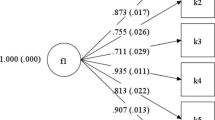Abstract
Objective
The present study presents the 1–year follow–up findings of the Munich 5–year follow–up study on relatives of first hospitalized patients with schizophrenia or depression. The aim of the study was to determine which factors moderate the impact of the patient's illness on the stress experienced by his key relative in different dimensions.
Method
Of the relatives who had participated in the baseline assessment, 90% could be reassessed (n = 69) with respect to their objective and subjective burden, well–being, self–rated symptoms and subjective quality of life as well as different personal dispositions and resources.
Results
Data demonstrate a considerable level of burden in most of the relatives at 1–year follow–up. Compared to baseline, a significant reduction in objective and subjective burden as well as significant improvements in well–being, self–rated symptoms and subjective quality of life occured in two–thirds of the relatives, while well–being and self–rated symptoms remained worse when compared to norm values. Although stress reduction was significantly associated with patients' residual symptoms on the bivariate level, no main effects on relatives' stress outcome at 1–year follow–up could be observed under multivariate conditions. In multivariate linear regression models for each stress indicator, different combinations of predictors resulted, explaining up to 75% of the total variance of the stress indicators. The most relevant predictors were relatives'expressed emotion and neuroticism, their generalized negative stress response and life stressors, having significant direct and indirect effects on relatives' stress outcome. Stress reduction was mainly caused by an interaction of relatives' generalized positive stress response and patients' residual symptoms.
Conclusion
Findings support the transactional character of the stress process in caring for a patient with a severe mental disease. A multidimensional approach is necessary to identify the most important predictors of burden in order to improve family intervention strategies which aim to reduce burden.
Similar content being viewed by others
References
American Psychiatric Association (1987) Diagnostic and Statistical Manual of Mental Disorders (DSM–III–R). Washington DC
Borkenau P, Ostendorf F (1993) NEO–Fünf–Faktoren Inventar (NEO–FFI) nach Costa und McCrae. Göttingen – Bern – Toronto – Seattle: Hogrefe
Bottlender R, Jäger M, Kunze I, Groll C, Borski I, Möller H–J (2003) Negative Symptome schizophrener Patienten aus der Perspektive der Psychiater, der Patienten selbst und deren Angehörigen. Nervenarzt 74:762–766
Boye B, Bentsen H, Ulstein I, Notland TH, Lersbryggen A, Lingjaerde O, Malt UF (2001) Relatives' distress and patients’ symptoms and behaviours: a prospective study of patients with schizophrenia and their relatives. Acta Psychiatr Scand 104:42–50
Brown S, Birtwistle J (1990) People with schizophrenia and their families. Fifteen–Year outcome. Br J Psychiatry 173:139–144
Butzlaff RL, Hooley JM (1998) Expressed emotion and psychiatric relapse: a meta–analysis. Arch Gen Psychiatry 55:547–552
Cornwall PL, Scott J (1996) Burden of care, psychological distress and satisfaction with services in the relatives of acutely mentally disordered adults. Soc Psychiatry Psychiatr Epidemiol 31:345–348
Derogatis LR (1977) SCL–90–R, administration, scoring and procedures. Manual for the R(evised) Version. John Hopkins University School of Medicine
Ferring D, Filipp S–H (1989) Bewältigung kritischer Lebensereignisse: Erste Erfahrungen mit einer deutschsprachigen Version der "Ways of Coping Checklist". Zeitschrift für Differentielle und Diagnostische Psychologie 10:189–199
Folkman S, Lazarus RS (1989) An analysis of coping in a middleaged community sample. J Health Soc Behav 21:219–239
Hamilton M (1960) A rating scale for depression. J Neurol Neurosurg Psychiat 23:56–62
Ho BC, Flaum M, Hubbard W, Arndt S, Andreasen NC (2004) Validity of symptom assessment in psychotic disorders: information variance across different sources of history. Schizophr Res 68:299–307
Janke W, Erdmann G (1997) Streßverarbeitungsfragebogen. Göttingen – Bern – Toronto – Seattle: Hogrefe
Jones SL (1996) The association between objective and subjective caregiver burden. Arch Psychiatr Nurs 2:77–84
Joyce J, Leese M, Kuipers E, Szmukler G, Harris T, Staples E (2003) Evaluating a model of caregiving for people with psychosis. Soc Psychiatry Psychiatr Epidemiol 38:189–195
Jungbauer J, Wittmund B, Dietrich S, Angermeyer MC (2003) Subjective burden over 12 months in parents of patients with schizophrenia. Arch Psychiatr Nurs 3:126–134
Kay SR, Fiszbein A, Opler LA (1987) The Positive and Negative Syndrome Scale (PANSS) for schizophrenia. Schizophr Bull 13:261–276
Krampen G (1991) Fragebogen zu Kompetenz– und Kontrollüberzeugungen (FKK). Göttingen – Toronto – Zürich: Hogrefe
Magana AB, Goldstein MJ Karno M, et al. (1986) A brief method for assessing expressed emotion in relatives of psychiatric patients. Psychiatr Res 17:203–212
Magliano L, Fadden G, Economou M, Held T, Xavier M, Guarneri M, Malangone C, Marasco C, Maj M (2000) Family burden and coping strategies in schizophrenia: 1–year follow–up data from the BIOMED I study. Soc Psychiatry Psychiatr Epidemiol 35:109–115
Möller–Leimkühler AM (2004) Burden of relatives and predictors of burden. Baseline results from the Munich 5–yeat–follow up study on relatives of first hospitalized patients with schizophrenia or depression. Eur Arch Psychiatry Clin Neurosci, Nov 19:1–9
Pai S, Kapur RL (1981) The burden on the family of a psychiatric patient: Development of an interview schedule. Brit J Psychiat 138:332–335
Priebe S, Gruyters T, Heinze M, Hoffmann C, Jäkel A (1995) Subjektive Evaluationskriterien in der psychiatrischen Versorgung – Erhebungsmethoden für Forschung und Praxis. Psychiat Prax 22:140–144
Ray J, Kulhara P, Avasthi A (1991) Social burden of positive and negative schizophrenia. Internat J Soc Psychiatry 37:242–250
Scazufca M, Kuipers E (1998) Stability of expressed emotion in relatives of those with schizophrenia and its relationship with burden of care and perception of patient’s social functioning. Psychol Med 28:453–461
Sommer G, Frydrich T (1989) Soziale Unterstützung: Diagnostik, Konzepte, F–SOZU. Dt. Ges. für Verhaltenstherapie, Tübingen
The Scottish Schizophrenia Research Group (1992) The Scottish first episode schizophrenia study VIII. Five–year follow–up: Clinical and psychosocial findings. Br J Psychiatry 161:496–500
Wiedemann G, Rayki O, Feinstein E, Hahlweg K (2002) The Family Questionnaire: Development and validation of a new self–report scale for assessing expressed emotion. Psychiatr Res 109:265–279
Zerssen D von (1976) Die Befindlichkeitsskala: Parallelformen Bf–S und Bf–S'. Beltz–Test, Göttingen
Author information
Authors and Affiliations
Corresponding author
Rights and permissions
About this article
Cite this article
Möller–Leimkühler, A.M. Multivariate prediction of relatives' stress outcome one year after first hospitalization of schizophrenic and depressed patients. Eur Arch Psychiatry Clin Neurosci 256, 122–130 (2006). https://doi.org/10.1007/s00406-005-0619-1
Received:
Accepted:
Published:
Issue Date:
DOI: https://doi.org/10.1007/s00406-005-0619-1




